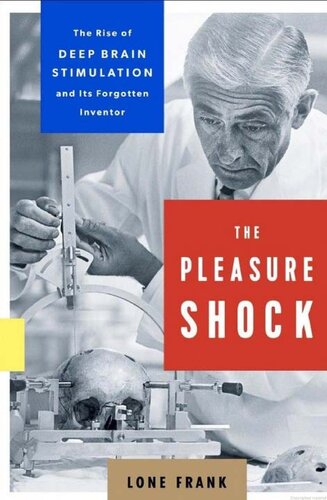
The Pleasure Shock
The Rise of Deep Brain Stimulation and Its Forgotten Inventor
- اطلاعات
- نقد و بررسی
- دیدگاه کاربران
نقد و بررسی

January 15, 2018
Science in the service of power can easily be warped and distorted--but, as this book shows, it can sometimes yield unexpected benefits.Robert G. Heath (1915-1999) was once a widely respected, influential psychiatrist at Tulane University. As neurobiologist-turned-science journalist Frank (My Beautiful Genome: Discovering Our Genetic Future, One Quirk at a Time, 2012, etc.) writes, Heath's biologically oriented work found many acolytes, among them a student who lost his academic chair later in life for having "prescribed too many interesting--and illegal--medications" to the university football team. Some of Heath's work was equally troubling on the ethical front. He likely worked with the CIA on mind control experiments. Moreover, as Frank's book opens, we find him attempting "to convert a homosexual man to heterosexual preferences through brain stimulation," having wired electrodes into the patient's brain's "pleasure center" and hired a female prostitute to effect the conversion. Heath's "brain pacemaker," as he called the electrode device, was applied to dozens of other patients suffering from schizophrenia and depression, a seemingly brutal application save that other remedies were more invasive electroshock treatments and lobotomies. It turns out, writes the author, that although Heath is forgotten or discredited today, he was on to something: what is called "deep brain stimulation" is at the forefront of psychological studies today, with uses that include treating PTSD and traumatic brain injury. Arriving at this conclusion took decades of work in neuroscience, including the ability to study MRI scans of neural centers, among them "brain regions involved with our motivation, our experience of fear, our learning abilities and memory, libido, regulation of sleep, appetite"--in short, activities of interest to industry and government as well as science. Heath's work may then have application after all, writes Frank, even if one psychiatric technician allows along the way that "maybe he shouldn't have done that experiment."A thoughtful, always interesting look into the workings of the mind--and the sometimes-surprising implications of how those workings have been revealed.
COPYRIGHT(2018) Kirkus Reviews, ALL RIGHTS RESERVED.

Starred review from January 22, 2018
Science writer Frank (My Beautiful Genome) takes a deep dive into the work of a controversial “pioneer by accident,” psychiatrist Robert G. Heath, whose use of electrode stimulation to the brain’s “pleasure center” to treat schizophrenia and depression in the 1950s and ’60s horrified and fascinated academia, the CIA, and the U.S. Senate. This wide-ranging, thoughtful exploration of Heath’s complicated legacy combs through documents, film footage, and interviews with Heath’s colleagues, his son, and a patient. It begins with the treatment of patient B-19, a gay man who was supposed to be cured with electrodes and a prostitute; when Heath died in 1999, his work was largely judged by that perverse episode: “It seems as if he had a vision of something of which he could not clearly see the contours—quite simply because science had not yet reached far enough and the tools were still primitive.” Though Heath’s work has been discredited, he began an approach that’s getting a new look from psychiatry and industry, making one psychosurgeon’s assessment particularly poignant: “You are a hero until you are not.” Frank has written an excellent, balanced portrait of an inventive psychiatrist with a complicated legacy. Agent: Peter Tallack, the Science Factory.

February 1, 2018
Deep brain stimulation (DBS) is an FDA-approved neurosurgery involving implantation of electrodes that selectively stimulate certain areas of the brain. It's an effective treatment for movement disorders (Parkinson's disease and essential tremor) that do not respond to the usual drug therapies. DBS has also been touted as a possible remedy for some psychiatric conditions, such as OCD and Tourette's. Frank, a PhD neurobiologist and science writer, portrays a DBS pioneer, psychiatrist Robert Heath of Tulane University. Heath began using brain stimulation on patients in the early 1950s for such conditions as schizophrenia, epilepsy, and depression as well as homosexuality. He was particularly interested in manipulating mood. His provocative career presented some serious ethical problems, including novel medical treatment and human experimentation. Nonetheless, the future of DBS looks rosy. In 2013 the Defense Advanced Research Projects Agency (DARPA) designated $70 million to further develop the technology for possible use in treating traumatic brain injury and other applications. Frank does a solid job of profiling the controversial Heath and investigating how science is propelled and complicated by personality, ego, and ambition.(Reprinted with permission of Booklist, copyright 2018, American Library Association.)




دیدگاه کاربران